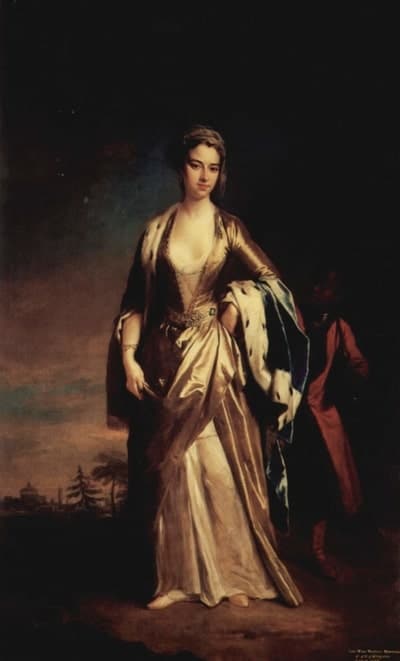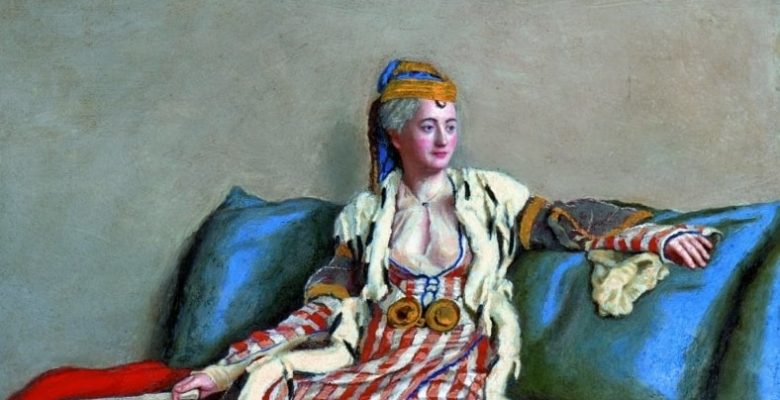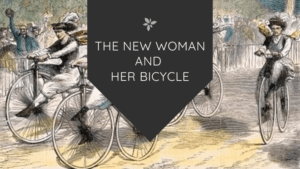Lady Mary Montagu was an eighteenth century noblewoman whose contributions to the fields of travel writing and medicine were nearly forgotten due to her sex. She was a vivacious and worldly woman in a period when women were expected to be nothing but demure, and is remembered for both her flamboyant personality & adventurous spirit. She railed against the patriarchy, while gleaning all she could from it. The compilation of her travel writings, aptly titled the, “Turkish Embassy Letters,” was published posthumously; should she have published it while alive, she likely would have needed to use a pseudonym.
Her biting wit and keen intellect won her favor with the court of King George I, but she was looked upon as a glamorized courtesan, as evidenced by the fact that she lost that favor once her face was marred by smallpox.
While the deadly disease ravaged England, she was lucky enough to accompany her husband (with whom she eloped, much to her family’s chagrin) to the Ottoman Empire, where she was introduced to the concept of vaccines by a group of native Turkish women. Much like the salon culture of France that existed concurrently, women in the Ottoman Empire congregated in the harems to both gossip and to develop their own medical tradition.
I am going to tell you a thing that I am sure will make you wish yourself here. The small-pox, so fatal, and so general amongst us, is here entirely harmless by the invention of ingrafting, which is the term they give it. […]
“I am patriot enough to take pains to bring this useful invention into fashion in England; and I should not fail to write to some of our doctors very particularly about it, if I knew any one of them that I thought had virtue enough to destroy such a considerable branch of their revenue for the good of mankind.”
Lady Mary Montagu

Despite bringing inoculations to the Western World, she was not deemed credible by the medical establishment of the day when she sought to correct their gross misuse of the concept she introduced. While a small scratch of the skin was all that was necessary, British quacks greatly increased the risk of complications and infection by “improving,” her technique. They scoffed at her corrections solely based on her gender, but she would not be dissuaded from disseminating the life-saving technique to all those who needed it in England.
Although she was a brilliant autodidact, she could not have achieved all she did without the privilege of her aristocratic birth, yet she must be commended for the ardor with which she fought for her cause once back in England. The concept of inoculation was slow to catch on for several reasons; the most relevant here being that it originated from Muslim women. She bravely demonstrated its success on her own children, yet King George I refused to have it performed on his sons (just his daughters, implying how much less he valued them).
We may never know how many lives could have been saved if people had listened to her sooner.
Although Ms. Montagu managed to live a life replete with adventure despite her sex, she was still aware of the limitations it placed on her. In one of her many letters, she warns her daughter Mary, “to conceal whatever learning she attains with solicitude,” in regards to the education of her granddaughter. Lady Mary herself was the target of sexist tirades throughout her life, most notably when Alexander Pope (whose advances she fought off) libeled her as, “Sapphos.” (Clearly, she only would have resisted him if she were a lesbian.) However, she clearly paid this attack little mind, as she happily ran off to Italy for a brief stint to cohabit with her bisexual lover before settling in provincial France to enjoy her old age.
Works Cited:
- https://poets.org/poet/lady-mary-wortley-montagu
- https://www.britannica.com/biography/Lady-Mary-Wortley-Montagu
- https://time.com/5542895/mary-montagu-smallpox/
- https://womenyoushouldknow.net/lady-mary-montagu-smallpox/
- Turkish Embassy Letters (Lady Mary Wortley Montagu, 1800)






Leave a Reply